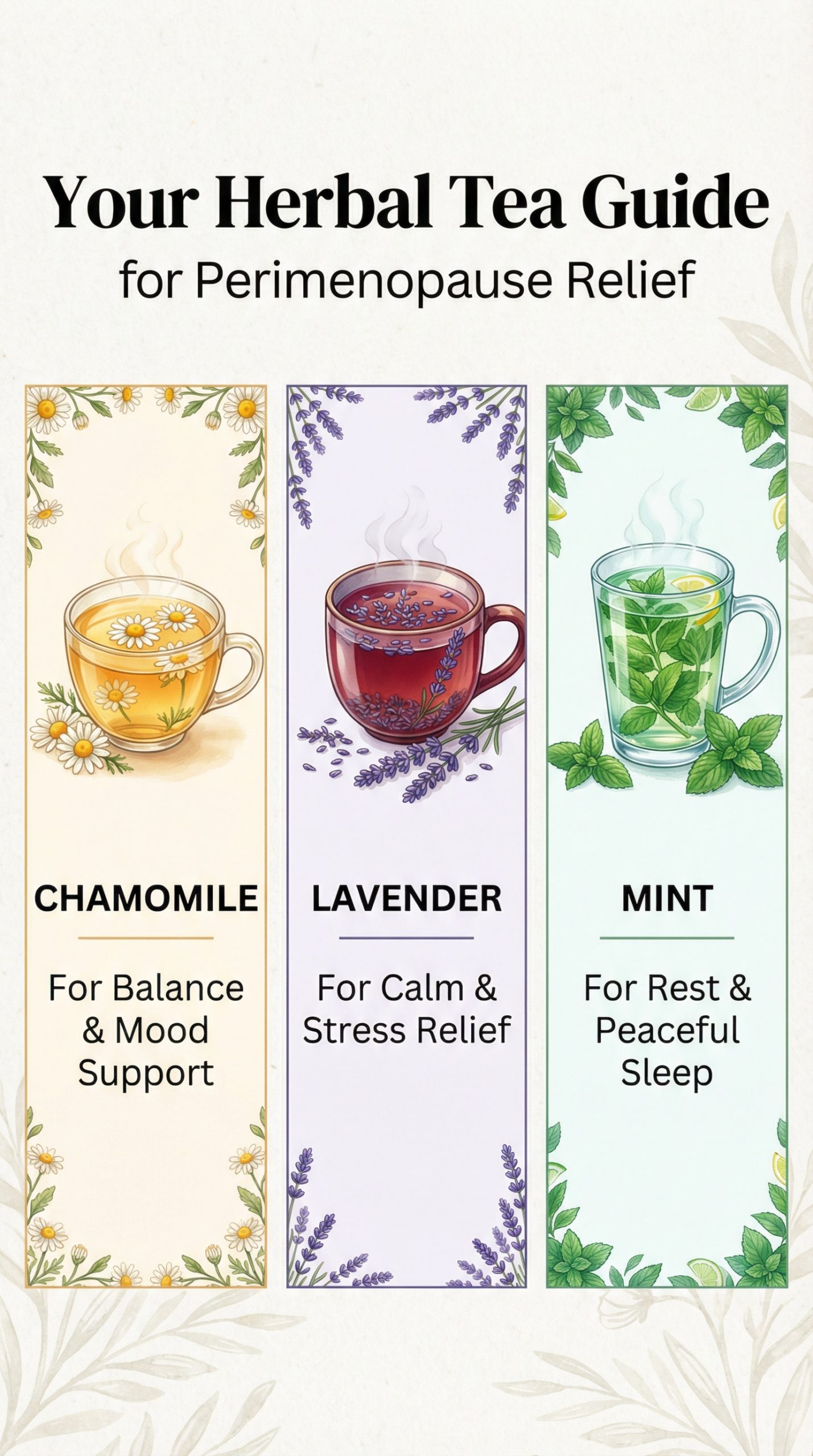Perimenopause is a natural phase of transition in a woman’s life, but it often comes with a variety of challenges, from fluctuating moods to disrupted sleep. While navigating these changes, incorporating gentle, natural routines can offer significant comfort and support. Among the simplest and most comforting of these are herbal teas.
For centuries, herbs have been used to support well-being. A warm cup of tea provides not only hydration but also a quiet moment for reflection and care. Here, we explore three wonderful teas, each chosen for its unique properties to assist with balance, calm, and rest during perimenopause.
Understanding the Role of Teas in Wellness
Before we look at our specific selections, it’s helpful to understand why herbal teas can be such a valuable tool. They offer a simple way to benefit from the natural properties of plants. This daily ritual can become a grounding practice, helping to manage stress and signaling to your body that it’s time to relax.
Tea 1: Chamomile for Balance
The tea for Balance in our guide features chamomile, often blended with a hint of lemon for brightness.
- Why Chamomile? Chamomile is one of the most well-known herbs for relaxation. Its gentle, soothing properties can be incredibly helpful when dealing with the irritability and mood swings that can accompany hormonal fluctuations. It helps to settle the nervous system, promoting a sense of inner equilibrium.
- How it Supports: By fostering a state of calm, chamomile can help you feel more centered and balanced throughout your day. It’s an excellent choice for moments when you feel overwhelmed or emotionally scattered.
- Brewing Suggestion: Steep 1-2 teaspoons of dried chamomile flowers in hot (not boiling) water for 5-10 minutes. A slice of fresh lemon can add a refreshing taste and a dose of Vitamin C.
Tea 2: Lavender for Calm
When feelings of stress and tension are high, the tea for Calm—featuring lavender—is a wonderful companion.
- Why Lavender? The aroma of lavender alone is famous for its ability to reduce feelings of anxiety and stress. When brewed as a tea, it provides a deeply calming effect on both the mind and body. It’s the perfect herb for unwinding after a long day.
- How it Supports: Lavender is particularly useful for easing the mental and emotional tension that often builds up during perimenopause. A cup in the afternoon or evening can help melt away the day’s worries and prepare you for a peaceful evening.
- Brewing Suggestion: Use about 1 teaspoon of dried lavender buds per cup. Steep for about 5 minutes. Lavender has a strong flavor, so you may want to start with a shorter steeping time. It pairs beautifully with a small amount of rosehip for added benefits.
Tea 3: Mint for Rest
A good night’s sleep can feel elusive during perimenopause, which is where our tea for Rest, centered around mint, comes in.
- Why Mint? Peppermint or spearmint are naturally caffeine-free and known for their ability to relax the body. Mint is especially good at soothing digestive discomfort, which can sometimes interfere with sleep. Its refreshing yet calming nature helps to clear the mind and relax the muscles.
- How it Supports: This tea is not a sedative, but rather a preparative for sleep. It helps to provide the ideal conditions for rest by calming the body and mind. It’s an excellent final step in your nightly wind-down routine.
- Brewing Suggestion: Steep a handful of fresh mint leaves or 1 teaspoon of dried mint in hot water for 5-7 minutes. It’s delicious on its own or with a tiny touch of honey.
The benefits of herbal teas are often felt most when they become a regular part of your routine. Try to incorporate these teas into your daily schedule. Perhaps a cup of Chamomile in the morning for balance, a cup of Lavender in the late afternoon to de-stress, and a cup of Mint before bed to encourage rest. Listening to your body and giving it consistent, gentle support can make a noticeable difference.
Beyond the Teacup: A Holistic Approach
While these teas are a fantastic tool, they are most effective as part of a broader approach to wellness during perimenopause. Consider these additional points:
- Nourishing Diet: Focus on whole foods, including plenty of fruits, vegetables, and lean proteins, to support your body’s changing needs.
- Regular Movement: Gentle exercise like walking or stretching can significantly help with mood, sleep, and overall physical health.
- Mindful Moments: Even a few minutes of quiet time, deep breathing, or prayer each day can help manage stress levels.
Embracing perimenopause with patience and self-compassion is essential. These soothing teas are more than just a warm drink; they are an invitation to slow down, listen to your body, and provide it with the gentle care it deserves during this important chapter of life.
Disclaimer: The information in this article is for educational purposes only and is not intended as medical advice. Please consult with a healthcare professional before making any changes to your health regimen, especially if you have pre-existing conditions or are taking medication.




